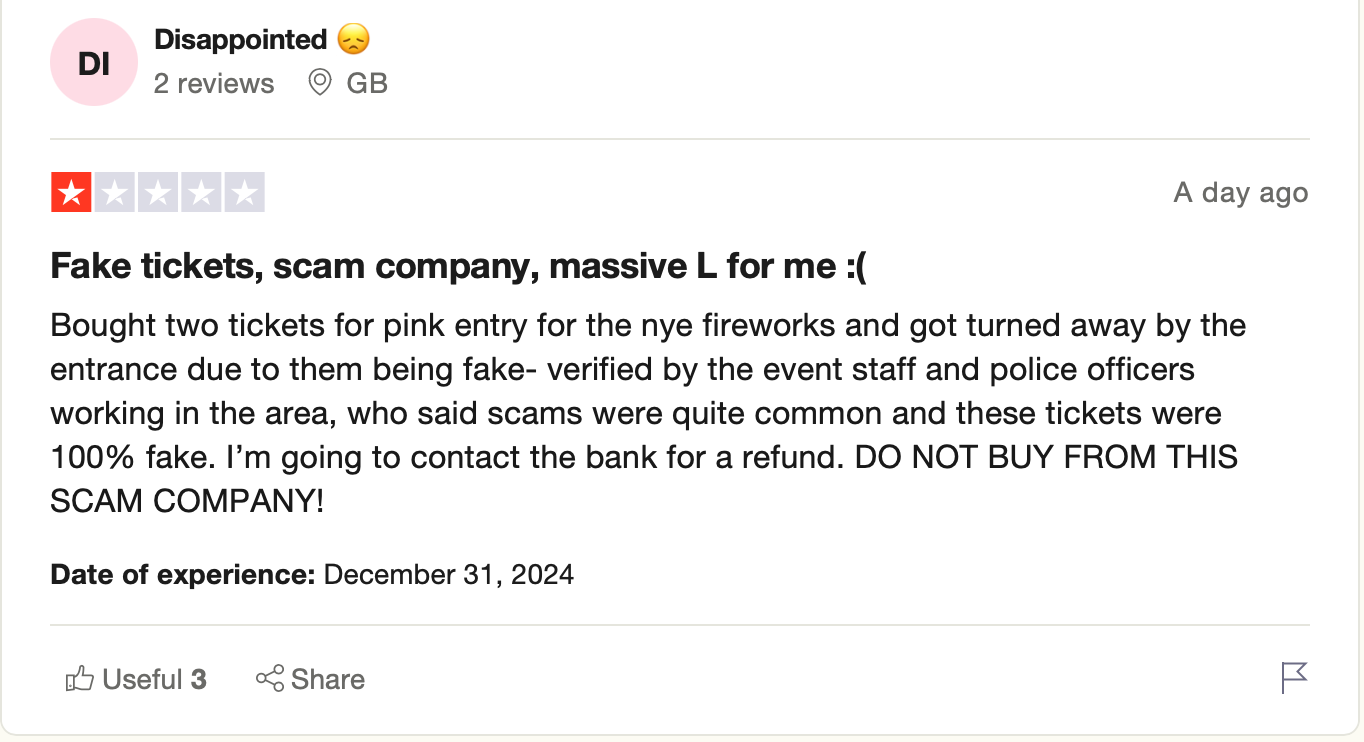Ticket to Getting Scammed
Season of Scams: Protect Yourself from Holiday Ticket Fraud
The festive season is a time for joy, celebration, and unforgettable events. But amid the holiday cheer, scammers are out in full force, targeting eager event-goers with fake tickets and fraudulent deals. From sold-out concerts to holiday festivals, unsuspecting buyers often fall victim to too-good-to-be-true offers. In this post, we’ll uncover common tactics used by ticket scammers, share red flags to watch for, and provide tips to ensure your holiday plans aren’t derailed by fraud. Stay safe and make your season truly memorable—for all the right reasons!
Inside the Scam

An example of the scammers’ creativity can be seen in websites like TicketApt.com, which are designed to appear trustworthy while deceiving unsuspecting buyers.
Although scammers nailed the visuals, several hiccups are a giveaway of their malicious intent.
Sparse "About" section

Interestingly, TicketApt.com includes several mentions of its supposed legitimacy, almost as if that’s the first thing the creators want you to believe. This tactic is a common strategy among scammers—they focus on preemptively addressing doubts to make their site seem trustworthy. Instead of showcasing credible credentials or independent reviews, these claims often feel forced or exaggerated. Legitimate businesses rarely feel the need to repeatedly declare their authenticity; instead, they let their reputation and transparency speak for themselves. This overemphasis on legitimacy should be a significant warning sign for anyone navigating such websites.
Another red flag on TicketApt.com is its overly generic business address. Fraudulent websites often list vague or non-specific addresses, such as "123 Main Street, City, Country," to create a facade of legitimacy without providing verifiable information. These addresses are typically untraceable or lead to unrelated locations, such as shared office spaces or non-existent buildings. Always cross-check the provided address through online maps or business directories to ensure it’s tied to a real and credible location. A generic or suspicious address is often a telltale sign of a scam.

Scammers often try to justify their questionable practices with claims like, "We’re the world’s largest secondary marketplace for tickets to live events. Prices are set by sellers and may be below or above face value." However, this statement is not only vague but also somewhat lost in translation—it doesn't quite make sense in the context of a legitimate business. The awkward phrasing and unclear language are common signs of a scam website trying to sound official without the substance to back it up. Genuine ticket resale platforms tend to be more straightforward and transparent about their pricing structure, without relying on convoluted statements to mask their intentions.
Fake reviews
Many of the 5-star ratings seem suspicious, with new accounts created solely to leave positive feedback. This tactic is often used by scammers to make their website appear legitimate and trustworthy.
ticketapt.com - trustpilot reviews
Minimalistic and down-to-business -- get scammed and go away
TicketApt.com has small headers and footers, with very little content overall—another sign of a scam. Scammers typically keep the site sparse and to the point, avoiding unnecessary details. This lack of transparency and minimal design is intentional, as they want to quickly lure users into making purchases without offering much information or time for scrutiny. Always be wary of websites that lack substantial content or ignore the usual conventions of a legitimate business.
It's not just TicketApt
A quick online search reveals plenty of similar websites to TicketApt.com, all following the same deceptive tactics. This pattern is common among scammers who create multiple sites, often using identical layouts and language to trick buyers. And they use the same awkward wording.

How to spot scam websites quickly
Here’s a complete guide to spotting scam websites quickly:
- Poor Design & Sparse Content: Scam sites often have minimal content, with small headers, footers, and vague information. Legitimate businesses usually provide detailed descriptions, contact information, and FAQs.
- Suspicious or Generic Reviews: Fake reviews are common on scam sites. If you see multiple 5-star ratings from recently created accounts with no detail, it's a red flag.
- Odd Language & Wording: Look for awkward phrasing or sentences that don't make sense. Scammers often use poorly translated content or strange wording to make their site look legitimate.
- No Clear Contact Information: Scam websites usually lack verifiable contact details. Be cautious if there’s no physical address, phone number, or customer support options.
- Too Good to Be True Offers: If ticket prices or other deals seem unrealistically cheap, be skeptical. Scammers often lure victims with prices that are far lower than market value.
- Multiple Similar Sites: A quick online search might reveal several other sites with the same layout, language, or offers. This indicates a scam operation using multiple platforms to deceive buyers.
- Lack of Security: Always check for "https://" and a padlock symbol in the URL bar. If the site doesn’t have these security features, it’s best to avoid it.
- Use Security Software: Install reliable security software with real-time phishing and scam identification features. This can help detect and block suspicious websites before you interact with them.
By staying alert to these red flags, you can protect yourself from falling victim to online scams.
And for the nerds out there...
Here are a few things that total nerds can do to spot scam websites:
- Check with VirusTotal: Use VirusTotal to scan the website URL and check for any known malicious activity or reports from multiple security engines.
- Perform a WHOIS Lookup: Use a WHOIS service to check domain registration details. Look for recently registered domains, hidden ownership, or mismatched contact information, which are common in scam websites.
- Examine SSL Certificates: Nerds can dig deeper into SSL certificates to ensure the website has a valid, trusted certificate. A scam site may have an invalid or self-signed certificate.
- Use DNS Lookup Tools: Run a DNS lookup to check where the website is hosted. Scam sites often use suspicious or offshore hosting providers to avoid detection.
- Check for IP Geolocation: Using IP geolocation tools, check where the website's server is located. A mismatch between the website's claimed location and the server’s true location could be a sign of a scam.
These are advanced methods that can help uncover hidden details and identify potentially fraudulent websites.






